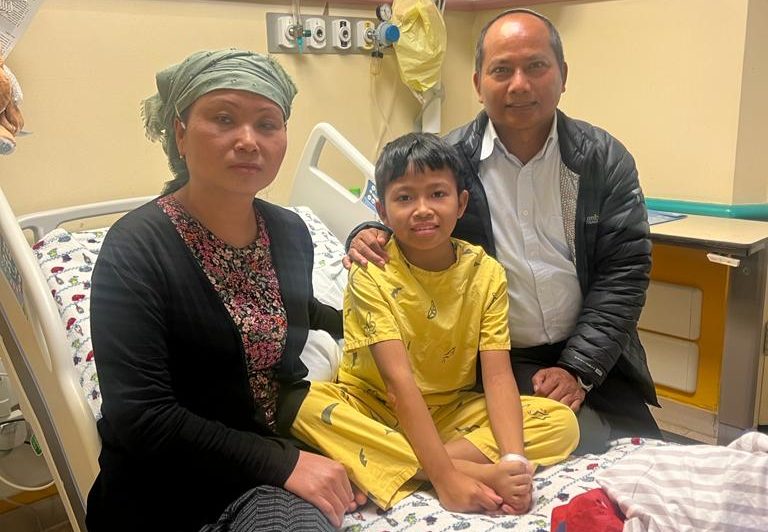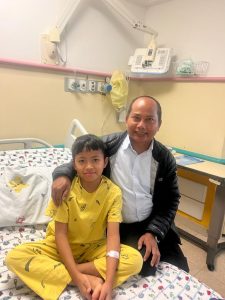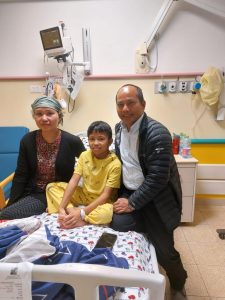
13-year-old Reuven received a new kidney because of a teacher in his school
It wasn’t until Yael Dvir asked for a day off for compatibility tests for a kidney donation that she realized that a student in the same grade she teaches, Reuven Beite, was looking for a new kidney. Reuven, from the Bnei Menashe community, immigrated to Israel from India with non-functioning kidneys. This altruistic teacher from his own school saved his life…
“There is no doubt that the hand of chance played here,” says Yael Dvir. “I teach in the same grade, but a different class, so I didn’t know Reuven. The day I approached the principal of the school to ask for a day off in order to test suitability for a kidney donation, he looked at me a little surprised and said: ‘Wait, you know we have a student with kidney failure that they are looking for a donor?’ From here everything started to unfold, something that has no other definition than a miracle.”
Dvir, 48, married, mother of seven and grandmother of four, a resident of Ma’alot, is the one who started the fundraising chain. “For years now, I have been thinking about the possibility of donating a kidney, a topic I was exposed to through the brochures issued by the ‘Gift of Haim’ association in synagogues. I would eagerly read the personal story of each donor and say to myself: they are people like me and like everyone else, working and having families and if they can, Why not me?”
So she did. The first attempt to donate a kidney to a kidney patient, also a resident of Ma’alot, was unsuccessful, since a donor had already been found for him and the transplant procedure was successfully completed. “I was happy that he was settled, but the fire was already burning in me.” At this point she shared in the programs not only her husband but also her children and extended family members. “Everyone was equally excited and happy for the privilege I had taken for myself and did not try, not even a hint, to loosen my hands.”
Dvir underwent a round of comprehensive tests, but the task was slightly postponed due to family events (“Two of my sons got engaged”), and last September the transplant coordinator in Beilinson informed her that she is not suitable to donate to Reuven. “I was very disappointed to hear that,” she says, “and I asked the coordinator: So what will happen to him? Who will donate to him? And she explained to me the procedure of cross-transplantation.”
Dvir agreed to donate a kidney to another patient, on the condition that the transplant center would promote Reuven on the list and find a suitable kidney for him. And that’s what happened. A short time later, a match was found between Dvir and the patient who was waiting for a transplant. “On December 28, I had the privilege of getting on the operating table and donating one of my kidneys to a sick person, who will get better thanks to the donation,” she describes excitedly. “I was euphoric and recovered quickly. Five weeks after the operation I was already back to a full life routine.”
Meanwhile, 13-year-old Baite had immigrated to Israel only a year ago. “We brought the family to Israel; Reuven’s mother, who was widowed from her husband, his sister, and Reuven himself, who was already very ill,” says Tzvi Khaute, the cousin of the deceased father of the family, who manages the Bnei Menashe aliya for Shavei Israel. “His illness, which was getting worse, spurred me to bring them as soon as possible and since then I have been taking care of all their needs.”
When they arrived in Israel, it was found that Beite was already suffering from a significant functional failure of the kidneys, and in order to receive the necessary dialysis treatments three times a week, the family lived in Ma’alot, near the Galilee Hospital in Nahariya.
“Reuven barely went to school, but on the days he felt better and came to class, he learned Hebrew quickly and even made friends,” the family members say. After a year of dialysis treatments, it was decided at the Galilee Hospital to transfer him to a Schneider kidney transplant.
Reuven came to us when it was unclear what caused the functional failure in his kidneys,” explains Dr. Sheli Levy, a senior physician at the Nephrology Institute at the Schneider Pediatric Center. “From the few documents the family had, it emerged that he was hospitalized at the age of three with a urinary tract infection and a kidney stone and at the age of nine he was hospitalized again for hypertension – a common phenomenon among kidney patients.
“He came to Schneider for pre-transplant tests, which showed that both of his kidneys were not functioning. In the absence of documents, we can only assume that the source of the problem is a congenital disorder in the kidney’s functions and its structure. The poor functioning of his kidneys, to the point of no functioning, caused him a series of problems. He did not grew taller and therefore needed growth hormone,” explains Dr. Levy, “when children with kidney disease develop additional problems, such as bone diseases, lack of appetite, and more.”
At the beginning of the month, a suitable kidney donation was finally found for the boy. The donor found to be suitable is Irit Dovdevani, 48, an educator, married and mother of five. “For at least eight years I have been rolling around in my head the idea of donating a kidney. The matter was accelerated by a teacher who works with me and donated. I envied her,” she says.
Dovdevani shared her family’s wish to donate and received a windfall. “In April a year ago, I was exposed to the story of Reuven, who needed an urgent donation. I contacted the Ezer Mezion association, underwent tests to diagnose the blood type and other tests and waited for an answer. In the meantime, I found Galia on Facebook, 57 years old, who had a kidney removed due to cancer and who, unfortunately, Her remaining kidney stopped working.”
No match was found between the two, but Dovdevani was found to be suitable to contribute to Beite. Since any altruistic donor can request or condition his donation by finding a kidney for the transplant candidate he intended to donate – Irit requested that Galia be promoted at the transplant center.
“I went through all the psychological tests and examinations and the Ministry of Health committee, when at each of the stations, and they are quite a few, they try to find out if I am okay with the donation, if I am aware that I will have one kidney left in my body, and that I did not ask for, nor did I receive, any monetary compensation for my donation. Two hours after the last committee, the association called me and informed me that my data corresponded to those of a 12-and-a-half-year-old boy.”
And so, three transplants were arranged: Eitan, an altruistic donor, donated a kidney to transplant recipient Moshe. Sivan, Moshe’s sister-in-law, donated to Galia, and Irit donated to Reuven – who, as mentioned, received priority in line thanks to Yael.
May they all have long, healthy lives!












